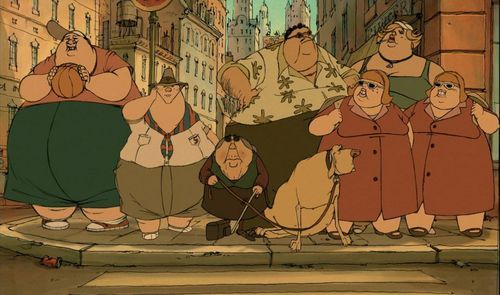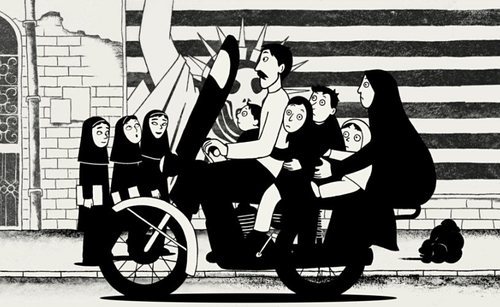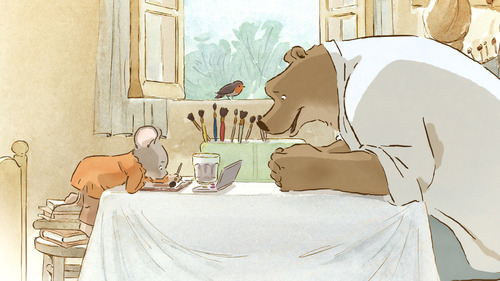What Is The Difference Between Est-ce Que And Qu'est-ce Que?
What is the difference between Est-ce que and Qu'est-ce que?

Asking questions is something fundamental in French, especially if you want to know more about something or get more information.
French people use Est-ce que and Qu'est-ce que to start their questions. They look alike but are not used the same way.
So, what is the actual difference between both question words? Find out more here and also practice with the Quiz at the end of the lesson.
Learn French With Chanty
More Posts from Edu-fuck-cated and Others
What to do during lockdown
(and work on your French):
Work on your pronunciation
Read some classics
Read some fanfiction
Listen to podcasts
Listen to TED Talks
Listen to music
Listen to the radio
Watch french movies (detailed, by period and type)
Watch dubbed/subtitled movies: The Simpson, Cesar and Cleopatra, The Man Who Knew Too Much, The Red Shoes, La Vérité
Watch cartoons
Watch youtubers
Watch let’s plays: 1 2 3 4 5
Work on some MOOCs
Learn about black holes, Pompei, giant animals, gladiators, the Dreyfus affair, Charles Manson, ants, Leonardo da Vinci, Rome, smelly cheeses, Mozart, the Bermuda triangle, meditation…
Follow french subreddits
Search our social media
Visit the Louvre online
Check my practice tag
And make sure your priorities are in order!

True Crime shows/channels
#1. Hondelatte raconte, on Europe 1
#2. Faites entrer l'accusé, on RMC Story
#3. Murders explained
#4. Canal crime
general study tips
this is just a quick list of study habits that work for me, as a straight a’s student
1. even if it’s not in your teacher’s presentation written on a slide, if you hear your teacher mention a fact, WRITE IT DOWN. you might need it later for a test.
2. when you’re rewriting your notes/compiling a study guide, pretend you’re making it for someone else. include everything, even if you think you know it. (unless you’re low on time, in which case, just write what you don’t know)
3. when you’re trying to learn a new concept, pretend you’re teaching it to someone else. this is a form of active learning, and the act of breaking the concept down into steps that you can teach will improve your understanding of the concept. (for the longest time, i actually didn’t even know this was an actual study technique, because i’ve always done it subconsciously!)
4. don’t over color your notes!! if you really need a key for all the colors, then you’re using way too many. try to stick with 2-3 pens/pencils. for me, i write most of my notes in black ink or pencil and i write the important concepts i might need to find quickly later (such as vocabulary) in red or blue pen.
5. have your water bottle next to you (so you remember to stay hydrated; this makes focusing easier as well), as well as any other things you might need during a study session so you don’t have to keep getting up to get stuff (which is pretty distracting for me as i’m easily sidetracked).
6. make it a habit to write lists of everything you need to do by the end of the weekend (or the end of that day, depending on how much work you have). this’ll help you familiarize yourself with your tasks so you have a clear plan of what needs to get done.
7. (not really necessary, just something i like to do!) learn to eat with your non-dominant hand so you can eat and take notes and turn pages w/out ripping them instead of scrolling through social media. keep in mind that sometimes, meal times are for taking your mind off school so unless you’re really pressed for time, it’s not a huge deal if you spend this time w/passive reading, texting friends, etc.
8. when you’re assigned a research project, COME UP WITH A THESIS FIRST so you know what to research. try to get all your research done within the first two days or so, to have more time to plan out how you’re going to structure it. then get your draft done (something is better than nothing) so you can revise at your own pace instead of rushing at the last minute.
9. prioritize your homework!! as someone who spends hours fencing and even misses school for fencing tournaments, is part of symphonic band, and on the robotics team (build season is suuuuuper busy), i can’t express how important this is!! if you have math first period, get that done first, whereas if you have math last period, you can do it at lunch and spend your time working on something that’s due in the morning. don’t do this all the time, but if you need to, know which teachers are more strict with due dates so if you really do need an extension, you’ll be asking the least strict teacher and will have much better chances of getting said extension.
10. if you study at home like me, change into new clothes (comfy clothes, but not pajamas) before cracking open your textbooks. it’ll help make you feel more refreshed and ready to start your homework, but not confined to uncomfortable uniforms from school. tie up your hair, if it’s long. try to study at a table/desk rather than in bed (for sleeping not studying) or on the floor (bad for your posture).
11. check out this post for productive things you can do when you aren’t studying, but still want to be productive!
hope these helped some of you!!
xoxo, sal
tips for college classes that nobody tells you
1. don’t load your hardest classes in one semester. find out which classes within your major are rumored to be tough and divide them out throughout your time in college.
2. don’t show up to class earlier than 10 mins early. the class before yours will likely still be in there finishing up, and you’ll either walk in in the middle of a lecture or have to stand outside for a long time. just get there 5-10 mins early and you’ll be fine!
3. create a group chat for all of your classes. find a few friends from class and make a group chat! this can be either on imessage, groupme, or whatever is most popular to use at your school. this can be your go-to place to ask questions about assignments, due dates, etc. before asking the professor!
4. as for class participation, quality>quantity. in most college classes (with the exception of huge lectures) participation accounts for a chunk of your grade, and some professors take that grade very seriously. however, this doesn’t mean you should raise your hand and talk whenever you find the opportunity- your professor (and your classmates, for that matter) will appreciate you much more if your comments and questions are less frequent and have more to add to the class.
5. the readings listed under a date in a class are due for that class, they are not homework for the next class. this is one of the biggest issues college freshman have at the beginning of their first semester. unless the professor specifically says otherwise, if the syllabus is set up to list each class individually with the readings underneath/beside the class, they are due for that class, not the next one.
6. make yourself known to your professor! this is especially important for a large lecture, where they won’t get to know you otherwise. stop by their office hours or go up to them after class and introduce yourself- making a connection with your professor can open more doors than you may know!
7. rate my professor is not always accurate. professors can get better or worse, and different people have different experiences. though it’s a great tool and you can still use it to see what people think, if you’re stuck with a professor that is ranked low, it doesn’t necessarily mean you’ll have a bad time in that class.
8. sometimes it’s okay to just skim your readings. you’ll find out soon enough if your professor basically goes over exactly what the reading says every class. if so, you only need to skim it over and take light notes. don’t spend hours closely reading a textbook that your professor is just going to go over word for word the next day (unless it helps you- if so, do it!)
9. the guy in class that answers every question isn’t smarter than you. that’s it.
10. if you come from a lower income area or a worse school district than your peers, you may be playing the “catch up game” for a while. it’s okay! i personally go to a college where most students here come from wealthy families across the world and were sent to the best high schools possible. if you, like me, come from a mediocre public school, you may feel like you’re a beat behind your peers when it comes to background knowledge. don’t give up. work hard, you’ll catch up with them soon. (also- they aren’t smarter than you just because they had better opportunities than you did growing up. at the end of the day, you ended up at the same college)
Diary Writing in French
cher journal - dear diary
- you can talk about how your day was - this is a great opportunity to apply your knowledge of past tenses.
How to say that you had a good day -
j’ai passé une très bonne journée
j’ai passé une excellente journée
j’ai passé une belle journée
j’ai eu une merveilleuse journée
j’ai passé une journée fantastique
How to say that you had a bad day -
Je n’ai pas eu une bonne journée
j’ai eu une journée affreuse - a really bad day
j’ai eu une mauvaise journée
j’ai passé une journée difficile
How to say that you had a busy day -
j’ai eu une journée des plus occupés
j’ai eu une journée chargée
la journée d’aujourd’hui s’est avérée fort occupée
How to say that you had a quiet/relaxing day -
j’ai eu une journée tranquille
j’ai passé une journée tranquille
j’ai profité d’une journée de détente
Talking about time -
hier - yesterday
hier soir - last night
hier matin - yesterday morning
hier après-midi - yesterday afternoon
demain - tomorrow
demain matin - tomorrow morning
demain après-midi - tomorrow afternoon
demain soir - tomorrow evening
le lendemain - the next day
cette semaine - this week
la semaine dernière - last week
la semaine prochaine - next week
ce mois-ci - this month
le mois dernier - last month
le mois prochain - next month
cette année - this year
l’année dernière - last year
l’année prochaine - next year
when talking about a coming day e.g. next saturday = samedi prochain/le samedi suivant
To add a dash of drama -
et mon cul, c’est du poulet ? - yeah right!
faire du cinéma - to be a drama queen
j’ai du mal à croire que - I can’t believe that
jai vraiment foiré sur ce coup là - I really stuffed up!
je n’arrive pas à y croire ! - I can’t believe it
je n’en crois pas mes yeux - I can’t believe my eyes
je n’en reviens pas ! - I can’t believe it!
mon cul ! - my arse! (when you don’t believe someone, say if they’ve been lying to you)
Let me know if there is anything that you think I should add or if there are any corrections:)
français | writing
hi friends! this list is basically a mash of literature/writing-related words…?

【 books/writing forms 】
l’anthologie (f) | anthology
le brouillon (m) | draft
le dictionnaire des synonymes (m) | thesaurus
épistolaire | epistolary
l’épopée (f) | epic
la nouvelle (f) | short-story
la pièce de théâtre (f) | play
la poésie (f) | poetry
la prose (f) | prose
la rédaction (f) | essay
le roman (m) | novel
【 literary devices 】
l’allégorie (f) | allegory
l’allitération (f) | alliteration
l’anaphore (f) | anaphora
la comparaison (f) | simile
l’hyperbate (f) | hyperbaton
l’imagerie (f) | imagery
la litote (f) | litotes/meiosis
la métaphore (f) | metaphor
l’oxymore (m) | oxymoron
la rime (f) | rhyme
【 people in the writing process 】
le/la dramaturge | playwright
l’écrivain (m) | author
l’éditeur/éditrice | publisher
l’égérie (f) | muse/creative inspiration
le rédacteur en chef/ la rédactrice en chef | editor (of a newspaper)
le réviseur/la réviseure | editor
【 punctuation 】
l’apostrophe (f) | apostrophe
les deux-points (m) | colon
les guillemets (m) | quotation marks (« »)
la parenthèse (f) | parenthesis/bracket
le point d’exclamation (m) | exclamation mark
le point d’interrogation (m) | question mark
le point (final) (m) | full stop
le point-virgule (m) | semi-colon
les points de suspension (m) | ellipsis
la ponctuation (f) | punctuation
le tiret (m) | dash
le trait d’union (m) | hyphen
la virgule (f) | comma
【 words 】
la consonne (f) | consonant
l’espace (f) | space
la lettre (f) | letter (of the alphabet)
le mot (m) | word
le paragraphe (m) | paragraph
la phrase (f) | sentence
la syllabe (f) | syllable
la voyelle (f) | vowel
【 extra 】
la bibliothèque (f) | library
la librairie (f) | bookstore
la littérature (f) | literature
la grammaire (f) | grammar
l’orthographe (f) | spelling
le stylo plume (m) | fountain pen
la tranche (f) | spine (of a book)
So if we wanted to watch some French animation, what films would you suggest?

the Triplets of Belleville is about an elderly woman searching for her son who was kidnapped in the middle of a Tour de France race. It’s largely free of dialogue, but the sound effects and such are wonderful. It was nominated for an Academy Award for Best Animated Feature—it lost to Finding Nemo.

A Cat in Paris is about a young girl and her cat who discover mysteries in the course of one night. It was also nominated for an Oscar for Best Animated Feature, but it lost to Rango.

Persepolis is based on an autobiographical graphic novel by Marjane Satrapi about her early life in Iran. It was nominated for an Academy Award for Best Animated Feature, but it lost to Ratatouille.

the Illusionist is about an aging magician and an imaginative young girl who form a father/daughter relationship. It was also nominated for a Best Animation Oscar, but lost to Toy Story 3.

The Rabbi’s Cat is a story about a cat who swallows a parrot and gains the ability to speak like a human. It is set in 1920’s Algeria.

Ernest & Celestine is the adorable story about a big bear and a little mouse who forge an unlikely friendship. It was also nominated for an Oscar in Best Animated Picture, but lost to Frozen.

Kirikou and the Sorceress is a story inspired by West African folklore that tells the story of Kirikou, a boy who was born with the ability to walk and talk, who saves his people from an evil witch. The film was popular enough to spawn sequels and a stage adaptation.

A Monster in Paris is a 3D animated musical film that is reaaaaalllly loosely based on the Phantom of the Opera. It’s set in 1910 and is about, surprisingly, a monster that lives in Paris, and his love for a young singer.

The King and the Mockingbird is an 80’s film about a cruel king titled Charles V + III = VIII + VIII = XVI, who is obsessed with a young shepherdess, and whose attempts to capture the young girl are thwarted by a mockingbird whose wife the King had previously killed.
Those are probably the most famous of the feature length animated films.
But the animated short films are just as glorious. Here’s a compilation of a bunch of short films and I can link you to others as well.
Sorry for the long answer but I just really love French animation.
Aspirated H- nouns
I have mentioned before that h- nouns, depending on if they come from the (most likely) Germanic or the Latin language, will be treated differently: a Frankish noun will not have a liaison (Un haricot, Les-/-haricots) but a Latin noun will have one (Un-(h)iver, Les-z-hommes). Think of them as the aspirated H- and the mute H-.
A few things to note:
Most of H- nouns are mute as French is a romance language, direct heir of Latin - the roman empire is known for philosophy, thinking, culture, politics. The Franks however led simpler lives and spent most of their time outside; when they invaded us, they left their mark in the vocabulary, especially in practical things: trees, foods, animals, weapons...
If you're unsure, try to think of the translation of a noun in Italian, Spanish, Portuguese, Romanian, or even Latin: if they're siblings, your noun is romance. Homme: hombre, uomo, etc.
If you don't know those languages, here's another test: try doing L' + noun and see if it could get mixed up with another word. Ex: La hache > L'hache > Lâche. This is especially true if the following vowel is -a- as it would be harder to pronounce.
If the word is borrowed to English (a Germanic heir), the H- is aspirated (Hamburger, Hockey, Hippie).
If an aspirated H- noun doesn't come from the Germanic language ("Vieux francique"), it might come from Old Norse (Houle), Arabic (Hasard), Latin (Harpe), or an onomatopeia (ex: An owl is Un hibou, which might just be a version of Hoo hoo, just like the Egyptians called cats "Mau").

A few common aspirated H- nouns:
Hache, f - ax
Haie, f - hedge, fence
Haine, f - hatred
Hâle, f - slight tan
Hameau, m - hamlet
Hanche, f - hip
Handicap, m - disability
Harcèlement, m - harassment
Haricot, m - bean
Harnais, m - harness
Hasard, m - chance, coincidence
Hâte, f - haste
Haut, m - top (Le haut du mur)
Hauteur, f - height (of objects)
Hérisson, m - hedgehog
Héros, m - hero
Heurtoir, m - door knocker
Hiérarchie, f - hierarchy
Hochement, m - nodding
Homard, m - lobster
Hongrie, f - Hungary
Honte, f - shame
Hors d'oeuvre, m - appetizer
Houle, f - swell (sea)
Hoquet, m - hiccups
Hors-la-loi - outlaw
Huis clos, m - closed session
Huitième - eighth
Hurlement, m - scream
-
 withyourglance reblogged this · 1 year ago
withyourglance reblogged this · 1 year ago -
 rhythmofherdrum liked this · 2 years ago
rhythmofherdrum liked this · 2 years ago -
 fabiomalzone liked this · 2 years ago
fabiomalzone liked this · 2 years ago -
 maemaemia liked this · 2 years ago
maemaemia liked this · 2 years ago -
 31713986 liked this · 2 years ago
31713986 liked this · 2 years ago -
 thepurplepeanut liked this · 2 years ago
thepurplepeanut liked this · 2 years ago -
 chellilonaaphra liked this · 2 years ago
chellilonaaphra liked this · 2 years ago -
 mfreedomstuff liked this · 2 years ago
mfreedomstuff liked this · 2 years ago -
 a-teenagewitch liked this · 2 years ago
a-teenagewitch liked this · 2 years ago -
 bowlingwithplanets liked this · 2 years ago
bowlingwithplanets liked this · 2 years ago -
 astrxlatry liked this · 2 years ago
astrxlatry liked this · 2 years ago -
 gutstobegentleandkind liked this · 3 years ago
gutstobegentleandkind liked this · 3 years ago -
 190801181119 liked this · 3 years ago
190801181119 liked this · 3 years ago -
 gubble-bum-spoon liked this · 3 years ago
gubble-bum-spoon liked this · 3 years ago -
 melitinez reblogged this · 3 years ago
melitinez reblogged this · 3 years ago -
 i-want-a-revelation liked this · 3 years ago
i-want-a-revelation liked this · 3 years ago -
 babushkoshka reblogged this · 3 years ago
babushkoshka reblogged this · 3 years ago -
 imissyoubutokay liked this · 3 years ago
imissyoubutokay liked this · 3 years ago -
 artisticvamps liked this · 3 years ago
artisticvamps liked this · 3 years ago -
 mellliflu0us liked this · 3 years ago
mellliflu0us liked this · 3 years ago -
 look-for-fairy-tales liked this · 3 years ago
look-for-fairy-tales liked this · 3 years ago -
 llvsgrnstf liked this · 3 years ago
llvsgrnstf liked this · 3 years ago -
 camillakeener liked this · 3 years ago
camillakeener liked this · 3 years ago -
 davfr liked this · 3 years ago
davfr liked this · 3 years ago -
 slaying-absolute-penis liked this · 3 years ago
slaying-absolute-penis liked this · 3 years ago -
 blue-maisie liked this · 3 years ago
blue-maisie liked this · 3 years ago -
 noctosun liked this · 3 years ago
noctosun liked this · 3 years ago -
 petitlangage reblogged this · 3 years ago
petitlangage reblogged this · 3 years ago -
 holdmejustbecavse liked this · 3 years ago
holdmejustbecavse liked this · 3 years ago -
 bloodstaineddeer liked this · 3 years ago
bloodstaineddeer liked this · 3 years ago -
 mrs-morpheus liked this · 3 years ago
mrs-morpheus liked this · 3 years ago -
 ceci-nest-pas-une-francaise reblogged this · 3 years ago
ceci-nest-pas-une-francaise reblogged this · 3 years ago -
 spanishcarlos liked this · 3 years ago
spanishcarlos liked this · 3 years ago -
 cordeliastudies reblogged this · 3 years ago
cordeliastudies reblogged this · 3 years ago -
 princedragonoverlord liked this · 3 years ago
princedragonoverlord liked this · 3 years ago -
 lies418 liked this · 3 years ago
lies418 liked this · 3 years ago -
 isthiscalled-living liked this · 3 years ago
isthiscalled-living liked this · 3 years ago -
 przetarteokladki liked this · 3 years ago
przetarteokladki liked this · 3 years ago -
 grapejuiceblu3s liked this · 3 years ago
grapejuiceblu3s liked this · 3 years ago -
 ooberblooper liked this · 3 years ago
ooberblooper liked this · 3 years ago -
 lepluiedanslafentre reblogged this · 3 years ago
lepluiedanslafentre reblogged this · 3 years ago -
 edu-fuck-cated reblogged this · 3 years ago
edu-fuck-cated reblogged this · 3 years ago -
 candyheartsjubilee liked this · 3 years ago
candyheartsjubilee liked this · 3 years ago
